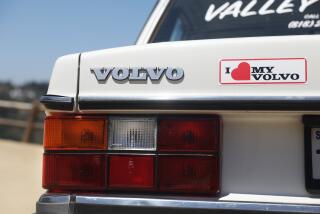Driving a Wedge in Saudi Sand : Culture: The Mideast nation’s government may think women need to be kept off the roads, but American feminists don’t. And all jokes aside, they’re proud of their hard-drivin’ Saudi sisters.
- Share via
America’s first woman driver was Genevra Delphine Mudge.
She drove a Locomobile in New York City in 1899, skidded on a patch of snow and knocked down five pedestrians.
In the near-century since, chauvinists have made sure the reputation of women at the wheel has remained in reverse.
Now the government of Saudi Arabia, responding to religious conservatives, has said women motorists are “portents of evil” who will be banned from driving.
And a hundred drive-time disc jockeys, several dozen stand-up comedians and most late-night monologists are poised to ask if we’ve heard the one about the Saudi woman who hopped into her Mercedes, turned left leaving Riyadh and collided with Yemen. She was later cited for driving under the influence of Western women.
To some veterans of the feminist wars, the issue may provide another somber moment for boycotts and marches, protests and padlocks. For other women, however, it is a time of levity--and revenge for jokes about women drivers that began the day Genevra Delphine Mudge arrived at traffic school.
“There are going to be many terrible jokes on late-night shows about women drivers, all based on untrue stereotypes,” said feminist attorney Gloria Allred. “That’s the problem. Whenever women try to win their rights, it is trivialized and people laugh at it as though it is a joke.”
In truth, she continued, the Saudi ruling has nothing to do with traffic safety. Or the abilities and inabilities of Saudi women drivers. It has everything to do, she said, with Saudi subordination of women and a new extreme in discrimination that amounts to gender apartheid.
And that was the precise, furious thrust of a letter of protest that Allred, as president of the Women’s Equal Rights Legal Defense and Education Fund, delivered Friday to the Saudi Arabian Consulate here. She drove to the consulate, of course. Earlier, there was an interview by car phone.
“But I’m sitting here on the freeway not moving, let alone driving,” she said. Then a thought occurred: “At this point, I’m not going to say it wouldn’t be a bad idea if men weren’t driving. Then I could just breeze right along here.”
So even for Allred, there is a little lightness in the Saudi situation--a ban that has led to demonstration drive-ins, job suspensions for women who participated in the protests, and government threats of “appropriate punishment” for defiant drivers.
Denise McCluggage, of Santa Fe, N.M., has raced and rallied cars in Europe and the United States, and is a columnist for AutoWeek and Glamour magazines. Tongue in cheek, she has decided on an “appropriate punishment” for the errant Saudi women drivers. “She’d have to change a flat tire that some guy has put on with a jackhammer,” McCluggage said.
That, she continued, isn’t the only foible of macho motoring: “Men assume they know everything about driving. Women are teachable and are aware that they don’t know everything about driving.
“And the reason they don’t know much about driving is because men taught them how to drive. Therefore, they can’t know much because men don’t know much.”
But Betty Friedan, author of “The Feminine Mystique” and America’s first feminist, is not amused.
“I was very proud of the Saudi women who staged that protest and insisted on their right to move,” she said from New York. “Let them find new ways of fighting their authoritarian oppressors.
“But don’t put any funniness stuff in my mouth. OK? Bye-bye.”
North Hollywood’s 250-miles-per-hour Shirley Muldowney, the only woman to win world drag-racing titles, thinks focusing international attention on one small problem of Arab women will have the positive result of “bringing the situation to light . . . and if you fight long enough for anything, you will make headway and you’re bound to win.”
Muldowney has her own solution to the crisis in the Persian Gulf: “Although I probably wouldn’t go over very big over there . . . I’d love to take Hussein for a drive. I’d give him a ride he’d never forget. He’d more than blink. He’d say uncle.”
Jean Lindamood, executive editor of Michigan-based Automobile magazine, thinks that as the world shrinks and influences spread, cultural insulation will weaken in nations like Saudi Arabia.
“There are people from all over the world passing through these countries, staying there, being there, and they will be the ruination of the Saudi culture,” she said. “Thank God.”
Lindamood derives much satisfaction from America’s military presence in Saudi Arabia, where “our women are guarding their country,” she said. “That must drive ‘em berserk, just nuts.”
More to Read
Sign up for Essential California
The most important California stories and recommendations in your inbox every morning.
You may occasionally receive promotional content from the Los Angeles Times.










